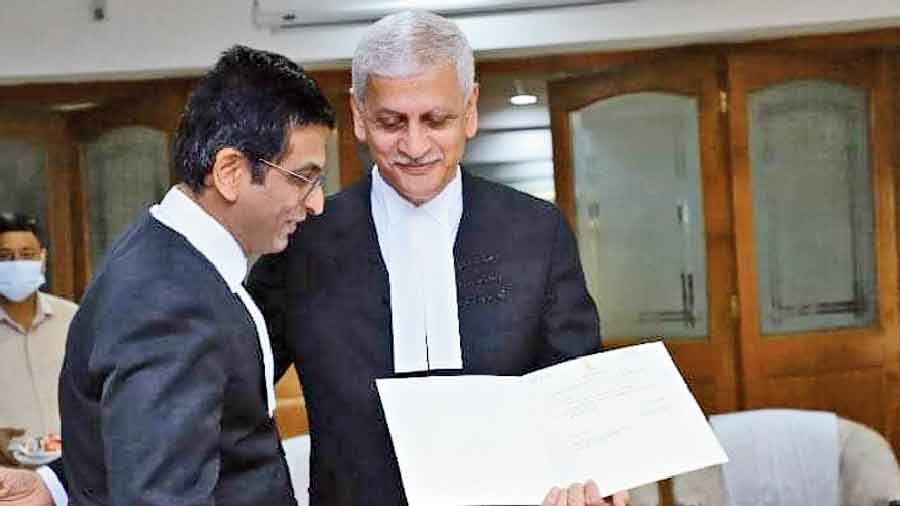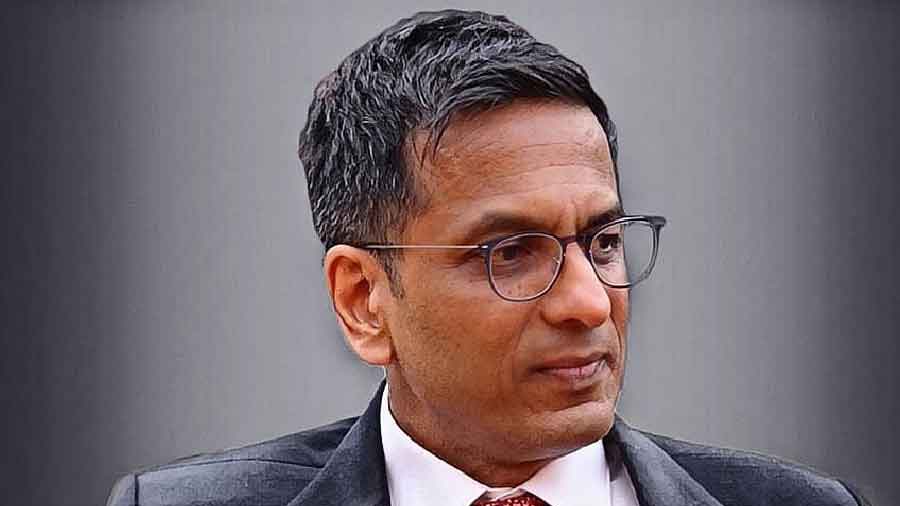Justice D.Y. Chandrachud, who had overruled his father and former Chief Justice of India Y.V. Chandrachud’s ruling that fundamental rights can be suspended during an Emergency, has been recommended by current Chief Justice U.U. Lalit as his successor.
Tuesday’s development comes a day after the Supreme Court collegium bared differences among its members over the procedure adopted by Justice Lalit for the appointment of four new judges, with Justice Chandrachud among the objectors.
A spirit of bonhomie prevailed in the Supreme Court on Tuesday morning. The CJI requested all the 28 judges to assemble on the lawns to witness a brief ceremony, during which he handed over a copy of the recommendation to Justice Chandrachud.
Justice Chandrachud, who hails from Maharashtra, will assume charge on November 9 and continue in the post till November 10, 2024, for a two-year term. Only one other CJI, Justice S.H. Kapadia, has in recent years occupied the post for over two years, from May 12, 2010, to September 28, 2012.
Justice Kapadia had succeeded Justice K.G. Balakrishnan, who held the top post for five years between January 14, 2007, and May 11, 2012.
Justice Lalit, whom the Union law ministry had requested on October 7 to recommend his successor, will be stepping down after a short tenure of just 74 days.
Justice Chandrachud, acclaimed for his integrity, independence, tech savvy and progressive outlook, had authored the judgment that declared privacy a fundamental right, given a dissenting judgment against social benefits being tied to Aadhaar, and headed the bench that granted bail to journalist Mohammed Zubair.
The right-to-privacy judgment by a nine-judge bench on August 24, 2017, had overruled a controversial five-judge ruling of 1976 (ADM Jabalpur vs Shivkant Shukla) that said a citizen had no fundamental right to approach a court during an Emergency.
Justice Chandrachud’s father, Justice Y.V. Chandrachud, was part of this five-judge bench. He went on to become CJI and held the post for a record seven years, from February 22, 1978, to July 11, 1985.
The 1976 judgment had drawn criticism from civil liberties groups and legal experts.
The five-judge bench included then Chief Justice A.N. Ray and Justices H.R. Khanna, M.H. Beg, Y.V. Chandrachud and P.N. Bhagvati. Justice Khanna was the sole dissenter, ruling that fundamental rights cannot be curtailed even during an Emergency. In 1977, the then Indira Gandhi government overlooked Justice Khanna and appointed his junior judge, Justice Beg, as CJI.
Four decades later, Justice D.Y. Chandrachud, authoring the 2017 judgment that struck down the controversial ruling, said: “The judgments rendered by all the four judges constituting the majority in ADM Jabalpur are seriously flawed. Life and personal liberty are inalienable to human existence.
“These rights are, as recognised in Kesavananda Bharati (1973), primordial rights. They constitute rights under natural law. The human element in the life of the individual is integrally founded on the sanctity of life. Dignity is associated with liberty and freedom.”
On September 26, 2018, Justice D.Y. Chandrachud was the sole dissenting judge in a 4:1 majority verdict that upheld the constitutionality of the Aadhaar Act.
“Constitutional guarantees cannot be subject to the vicissitudes of technology,” he wrote.
“Denial of benefits arising out of any social security scheme which promotes socioeconomic rights of citizens is violative of human dignity and impermissible under our constitutional scheme.”
Justice Chandrachud said the Aadhaar programme treated every citizen as a potential criminal and did not require the State even to draw a reasonable belief that a citizen might be perpetrating a crime or identity fraud.
“When the State is not required to have a reasonable belief and judicial determination to this effect, a programme like Aadhaar, which infringes on the justifiable expectations of privacy of citizens flowing from the Constitution, is completely disproportionate to the objective sought to be achieved by the State,” he said.
On July 20 this year, a three-judge bench headed by Justice Chandrachud granted bail to AltNews co-founder Zubair in the multiple FIRs registered against him and directed his immediate release.
It restrained his arrest in any future FIRs on the “same subject matter” of his tweets allegedly hurting Hindu sentiments.
Justice Chandrachud refused the Uttar Pradesh government’s plea to restrain Zubair from posting further tweets, wondering whether restraining a journalist from writing or tweeting wasn’t similar to restraining a lawyer from arguing or an ordinary citizen from speaking.











